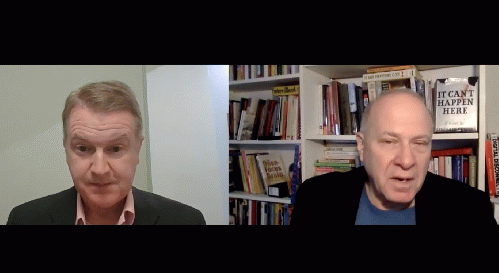Broadcast 3/16/2019 at 7:59 PM EDT (18 Listens, 34 Downloads, 2796 Itunes)
The Rob Kall Bottom Up Radio Show Podcast
| Copyright © Rob Kall, All Rights Reserved. Do not duplicate or post on youtube or other sites without express permission. Creative commons permissions for this site do not apply to audio content or transcripts of audio content. | ||||
Ian Hughes is the author of Disordered Minds; How Dangerous Personalities are Destroying Democracy.
He's a research fellow at the Environmental Research Institute at University College, Cork, Ireland. His blog, disorderedworld.com focuses on dangerous personality disorders and their consequences.
Why did you write this book?
You say there's a small minority of people who live among us whose psychology is such that it almost necessitates calling them a different type of human being., and that they have dominated the normal majority for most of human history
Tied to three diagnoses
How do religion and financial institutions fit into this picture?
How do these people come into power and what can we do about them?
Strengthening of Democracy needed. Democracy can be understood as a system of defenses against dangerous personalities.
Dangerous Personality disorders and definitions
Psychopaths; .5-1% of population
Narcissistic Personality Disorder: .5-1% of population
Paranoid personality disorder 4% of population
containment
Ego ideal instead of super-ego
Majoritarians are not Democrats, or Democracycrats
8th pillar of Democracy"Stop people who oppose Democracy and dont believe in it.
Jason Sterns told: When violence starts, society seems like a centrifuge. Only the most ruthless can stay in the center
How individual disorders become mass pathology
Instances of mass political violence typically occur when Psychopahts, narcissists and paranoids cooperate"when the ruthlessness of psychopaths combines with the arrogance of narcissists and the fear mongering of paranoids, society often has little defense. And they can often co-exist in one individual.
Stalin Hitler, Mao, Pol pot
Character of a tyrant
Groups rise to power
Role of ideology, how ideology changes once in power.
Hoffers True Believer
Destructive charismatics
How do ordinary people commit extraordinary acts of violence?
Amador"Savater warns humanity is not a given
Collectivization"a top down approach"used to starve people
You have hope.
Characteristics of dangerous personality leaders:
Dehumanizing of opposition, demand for complete submission of subordinates , narcissitic rage, extreme risk take, unrealistic optimism, inability to change course in the face of a disaster, charisma, relentless paranoia.
Rigidly fixed personality
Toxic triangle. How did they seize power?
Democracy as defense
Democracy is suffering a crisis of legitimacy
Social democracy
Eliminating democracy
Democracy as a m oral system
Connection between modern capitalism and your theme?
How poverty empowers dangerous personalities
Psychopaths and religion and the poor
Economist Joseph Schumpeter
Inequality and dangerous personalities
152 Neoliberalism
Hope"needed strengthening of democracy
Size: 83,534,912 -- 0 hrs, 58 min, 0 sec










